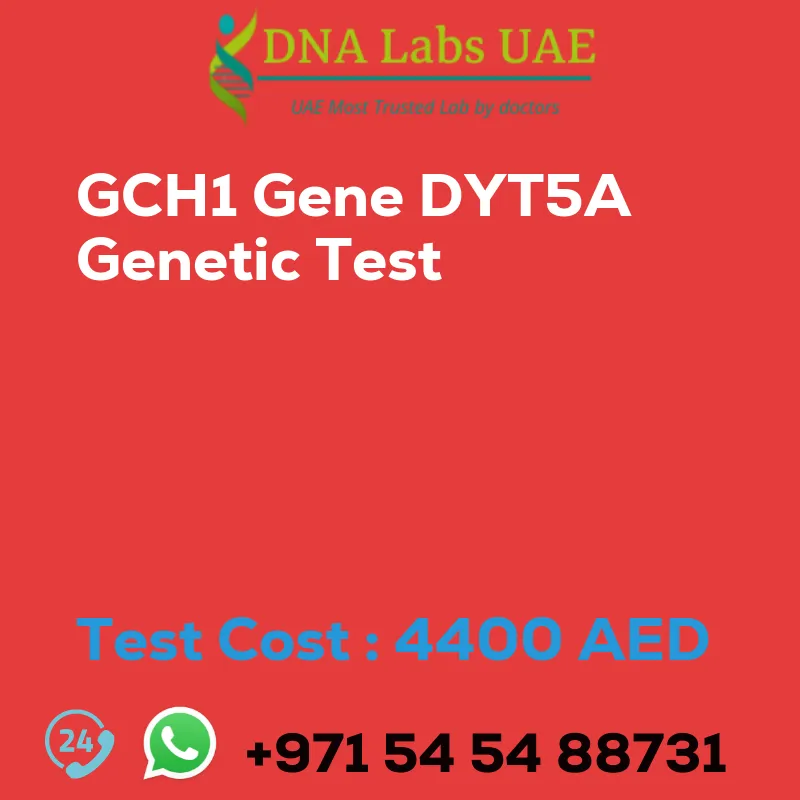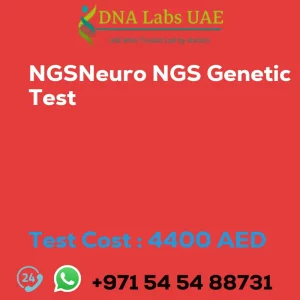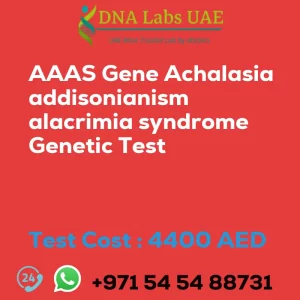GCH1 Gene DYT5A Genetic Test
Test Name: GCH1 Gene DYT5A Genetic Test
Components: Blood or Extracted DNA or One drop Blood on FTA Card
Price: 4400.0 AED
Sample Condition: Blood or Extracted DNA or One drop Blood on FTA Card
Report Delivery: 3 to 4 Weeks
Method: NGS Technology
Test Type: Neurological Disorders
Doctor: Neurologist
Test Department: Genetics
Pre Test Information: Clinical History of Patient who is going for GCH1 Gene DYT5A NGS Genetic DNA Test. A Genetic Counselling session to draw a pedigree chart of family members affected with GCH1 Gene DYT5A
Test Details
The GCH1 gene is associated with the development of DYT5A, also known as Segawa syndrome or dopa-responsive dystonia. DYT5A is a rare genetic disorder that affects the nervous system, causing movement problems such as muscle stiffness, tremors, and difficulty with coordination.
NGS (next-generation sequencing) genetic testing can be used to identify mutations in the GCH1 gene that may be responsible for DYT5A. This type of genetic testing uses advanced technology to analyze multiple genes at once, allowing for more comprehensive and accurate results.
Identifying a mutation in the GCH1 gene can help with the diagnosis of DYT5A and guide treatment options. In some cases, medications that increase the levels of dopamine in the brain can be effective in managing symptoms.
It is important to note that genetic testing is not always necessary for the diagnosis of DYT5A, as other diagnostic tests and clinical evaluations can also be used. Genetic counseling may also be recommended for individuals and families affected by DYT5A to better understand the inheritance pattern and potential risks for future generations.
| Test Name | GCH1 Gene DYT5A Genetic Test |
|---|---|
| Components | |
| Price | 4400.0 AED |
| Sample Condition | Blood or Extracted DNA or One drop Blood on FTA Card o |
| Report Delivery | 3 to 4 Weeks |
| Method | NGS Technology |
| Test type | Neurological Disorders |
| Doctor | Neurologist |
| Test Department: | Genetics |
| Pre Test Information | Clinical History of Patient who is going for GCH1 Gene DYT5A NGS Genetic DNA Test A Genetic Counselling session to draw a pedigree chart of family members affected with GCH1 Gene DYT5A |
| Test Details |
The GCH1 gene is associated with the development of DYT5A, also known as Segawa syndrome or dopa-responsive dystonia. DYT5A is a rare genetic disorder that affects the nervous system, causing movement problems such as muscle stiffness, tremors, and difficulty with coordination. NGS (next-generation sequencing) genetic testing can be used to identify mutations in the GCH1 gene that may be responsible for DYT5A. This type of genetic testing uses advanced technology to analyze multiple genes at once, allowing for more comprehensive and accurate results. Identifying a mutation in the GCH1 gene can help with the diagnosis of DYT5A and guide treatment options. In some cases, medications that increase the levels of dopamine in the brain can be effective in managing symptoms. It is important to note that genetic testing is not always necessary for the diagnosis of DYT5A, as other diagnostic tests and clinical evaluations can also be used. Genetic counseling may also be recommended for individuals and families affected by DYT5A to better understand the inheritance pattern and potential risks for future generations. |







